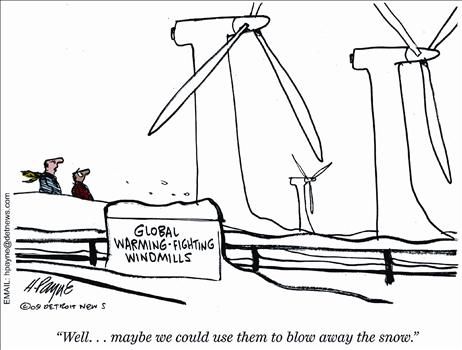
(CNN) -- We need to introduce simple arithmetic into our discussions of energy. Our failure to talk straight about the numbers is allowing people to persist in wishful thinking, inspired by inane sayings such as "every little bit helps." [snip]
In total, the European lifestyle uses 125 kWh per day per person for transport, heating, manufacturing, and electricity. That's equivalent to every person having 125 light bulbs switched on all the time. The average American uses 250 kWh per day: 250 light bulbs.
And most of this energy today comes from fossil fuels. What are our post-fossil-fuel options? [snip]
- To supply 42 kWh per day per person from solar power requires roughly 80 square meters per person of solar panels.
- To deliver 42 kWh per day per person from wind for everyone in the United States would require wind farms with a total area roughly equal to the area of California, a 200-fold increase in United States wind power.
- To get 42 kWh per day per person from nuclear power would require 525 one-gigawatt nuclear power stations, a roughly five-fold increase over today's levels.
I hope these numbers convey the scale of action required to put in place a sustainable energy solution. The sober message about wind and solar applies to all renewables: All renewables, much as I love them, deliver only a small power per unit area, so if we want renewable facilities to supply power on a scale at all comparable to our consumption, those facilities must be vast.
The public discussion of energy options tends to be emotional, polarized, mistrustful and destructive. I hope that focusing attention on the numbers may make it possible to develop honest and constructive conversations about energy.
David MacKay is a professor of physics at the University of Cambridge. His book, "Sustainable Energy - Without the Hot Air," is published by UIT Cambridge and is also available in electronic form for free from http://www.withouthotair.com/.
READ MORE
image toon - grn engry - Windmills used to blow away snow














6 comments:
Lets make a very simple comment here on the solar number quoted. 42 kWh per person require 80 square meters is only 800 sq ft. Part of this need therefore could easily be met by putting solar panels on the roof. We must not ignore that there is a vast amount of solar installation space available in roof tops across the US.
My friend says:
This article is interesting, but ultimately misleading in the end. It is not as if we are going to have a few or several energy production solutions. We will have dozens, if not hundreds. We will have hundreds, and already have had hundreds of, energy saving solutions. This is not indicated by the article.
He also does not try to whack nuclear like he tried to whack solar. In fact it is much easier to whack nuclear if you stick to the most important relevant facts. 500 nukes would cost about $18.5 trillion in capital payback on construction over 30 years. Solar, wind, etc. combined with energy efficiency will cost far less than the same amount of nuclear capacity. In fact, the nuke capital cost is so prohibitively high that we will not be able to afford the other options, and we will not get our needs met -- a double whammy. Then on top of the $18.5T figure, there is fuel, O&M, transmission and distribution, waste storage, etc. This guy is not being real.
I like his beginning methodology, but not when he betrays the mission of true energy education.
I don't buy that $18.5T figure. The proposed Levy County Florida plant will cost $17B for 2 reactors. That would equate to about $4T for 500 reactors. O&M, transmission, and distribution are not unique to nuclear. Fuel is extraordinarily cheap -- 2 years' worth of fuel for a gigawatt reactor is around $100M-$200M, which produces about 17 billion kWh for a total fuel cost of about 1 cent per kWh.
The real problem with nuclear is waste management, but it's not being addressed as it should.
Interesting article... but there are a few things left out or misleading.
First, solar doesn't necessarily mean solar cells. Some of the most promising technologies today are the solar concentrating type technologies in utility grade plant configurations. The main problem here is the lack of a good grid to get the power out of the best places to locate such plants... but it isn't a insurmountable hurdle.
Second, I would really like to see end-to-end math on electric cars being 4x more efficient than gas cars. I'm not sure I'm buying that figure, even if we don't take into account the pollution from batteries. And, are we in any manner comparing apples to apples as far as the car is concerned. For example, are we comparing say a VW TDI to an electric car with similar levels of performance? or, just some average gas car with the best of electric cars?
Third, I'm guessing transportation isn't the biggest piece of our consumption pie for the average person, so I'm thinking we're focusing way too much on that aspect. People buy a car that gets a few MPG better mileage, and then think they are saving the world. I'd rather see people overall attack the inefficiencies, and push our government to get some of the alternatives in place than to just buy a Prius. Overall, that move isn't doing all that much. They could probably add some insulation to their attic or take one less shower per week and beat all the Prius could ever save.
Fourth, while he is currently correct about hydrogen, it is good they are working on it, as it is a pretty good clean storage method. There are bio approaches to production of hydrogen being worked on, as well as the fact that if we produced the energy to produce hydrogen with things like the solar concentrating methods, hydrogen would be a very workable solution.
Ultimately, while efficiency isn't a bad thing, we need to find solid production of energy solutions long-term. We also need to be sure we aren't having an overall larger negative environmental impact in our frenzied attempt to combat global-warming.
Unfortunately, "introducing the simple arithmetic" doesn't add up - 125 kWh/day does NOT equal 125 light bulbs on all the time. It is 52 (for a 100 watt bulb).
52 x 100 watts x 24 hours/day = 124,800 watt hours/day = 125 kWh/day.
Let's hope the rest of the math used in the article is better.....
The author does not think it makes sense to unplug the little devices (phone chargers, etc..) because they only consume 0.01 KWh a day.
According to the census there are 121,000,000 housing units in the US. Even counting that only half would have little devices, the total amount of energy used would be 60,000,000 times 0.01 kwh or 600,000 kwh per day
It takes one ton of coal to produce 2,460 kwh in a power plant. So not unplugging the little devices, requires us to burn 600,000 /2460 or 243 tons of coal extra every day, or more than 88,000tons every year.
Yes "introduce simple arithmetic" but then use it. You will find out that at the end that it does make sense for all of us to learn to unplug those little things
Post a Comment